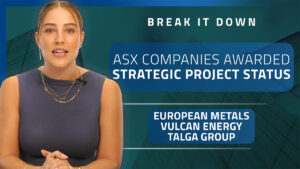The Ethical Investor: Why hardball attacks on ESG are nuts, and why they’re not going anywhere

Is ESG criticism misguided? Picture: Getty Images
- The ESG industry is currently undergoing a ‘trial by fire’
- One billionaire believes ESG is here to say, while another thinks it’s a ‘scam’
- Stockhead reaches out to eInvest’s analyst Maddie Huynh
The ESG industry is at a critical crossroads. At one end is a mean looking market full of bears, and that’s making the other end doubt the path they’ve all taken.
While some were already sceptical, others are now beginning to question the industry’s relevance altogether.
According to Bloomberg Green, analysts at Credit Suisse are predicting the possibility of ESG fund outflows in the second half of the year as regulators begin to circle the industry.
The US SEC recently announced that it will go ahead with the proposed amendments of rules and reporting for companies under its jurisdiction.
Under the new rules, the SEC will now require funds and advisers to provide more specific disclosures in fund prospectuses, annual reports, and adviser brochures based on the ESG strategies they pursue.
The rule change will also force US-listed companies to report GHG (green house gases) emissions from upstream and downstream activities in the company’s value chain (Scope 3 emissions).
This will have a broad impact – possibly forcing smaller private companies, those who supply to the larger publicly listed ones, to also disclose their footprints in order to comply.
The SEC also said it wants to crack down on greenwashing by asset managers, putting more pressure on giants like Goldman Sachs and Deutsche Bank who recently found themselves in the crosshairs for allegedly making misleading claims on ESG.
Is ESG here to stay?
But not everyone is writing ESG off, and in fact, some see good coming out of the current ordeal.
Billionaire Larry Fink, the CEO of Blackrock, believes that ESG investing is here to stay.
“The connection between purpose and sustainability is the larger point here – that what is good for the environment and for all stakeholders, can be good for profit,” Fink said in a Blackrock investor letter.
“And sustainability is moving from a niche category to one that will define the years to come.
“The advent of sustainable investing is akin to the introduction of organic apples. It’s a robust market that’s here to stay,” he added.
Not all billionaires agree.
In response to Tesla being kicked out from the S&P 500 ESG Index in May, Tesla CEO Elon Musk tweeted:
ESG is an outrageous scam!
Shame on @SPGlobal
— Elon Musk (@elonmusk) May 18, 2022
‘ESG attacks are misguided’
Musk doubled down a couple of weeks later, tweeting: “I have yet to see an ESG list that *isn’t* fraudulent”
But according to ESG expert Tim Nash of Corporate Knights, these attacks on ESG are misguided, and increasingly coming from people in high places.
In April, venture capitalist and PayPal founder Peter Thiel said in an interview that “ESG is a hate factory, comparing it to the Chinese Communist Party.
Even former US vice-president Mike Pence joined the attack, saying “liberal activist investors are forcing private companies to abide by ESG investing principles, elevating left-wing environmental, social, and corporate governance goals over the interests of the business.”
Nash argues that most of these ‘hit jobs’ seem intended to score political points with a specific audience.
“Musk’s comments align closely with his recent embrace of right-wing politics,” he said.
“Thiel’s speech was made at a Bitcoin conference where attendees must have been upset about cryptocurrencies coming under fire for their heavy carbon footprint.
“Pence meanwhile was speaking at an oil and gas conference where executives are being asked tough questions by investors looking to decarbonise their portfolios,” added Nash.
Interview with eInvest’s Maddie Huynh
Stockhead reached out to eInvest’s Associate Investment Analyst, Maddie Huynh, to get her views on whether Musk’s claims are justified.
Do you agree with what Elon Musk said about ESG?
“As an ESG analyst, I tend to agree with Elon that third-party ESG ratings are not particularly reliable,” Huynh told Stockhead.
“Not only is the ESG landscape extremely vast and difficult to summarise in a single data point, ESG ratings provided by third-party data providers fail to capture whether a company is making a positive or negative impact in the world.
“For Elon, his reluctance towards ratings likely comes from the fact that the way third data providers score ESG is often overweight reduction of negative impacts, while neglecting the positive impacts.
“Despite the challenges of using third party ratings, these ratings are frequently used by investors because unfortunately, there is not a lot of agreement out there on how to measure ESG.”
So should we disregard ESG scores?
“To be clear, ESG scores are not bad, they certainly provide a helpful analysis of ESG credentials,” said Huynh.
“But it is important to also look at the ESG integration component for a company, and analyse how the company is integrating ESG into their business model, and if there is any positive outcome as a result.
“We believe a solution to overcome the challenges associated with third-party scores is to account for both positive and negative impacts, and score company engagement as the key indicator of the company’s ESG performance.
“It shows where they are at, where they are headed, and how authentic their approach to ESG and sustainability is.”
So, what are some of the signs of good company engagement?
“First, transparent and detailed disclosure of ESG information in annual reports, sustainability reports, results presentations, or any other publicly available documents,” explained Huynh.
“Second, management and the board can address specific ESG questions when asked, and are aware of all applicable ESG related laws such as the Modern Slavery Act.
“And third, they need to respond promptly to analyst communications regarding AGM proposals or material ESG related concerns.”
How do you measure ESG at eInvest?
“For our eInvest Better Future Fund (ASX: IMPQ), we employ our own proprietary ESG scoring system that serves as a solution to these challenges,” Huynh said.
“A key benefit to doing our analysis in-house is that we can use any data we collect from analyst engagements with management teams and boards to assess the company’s willingness to engage on ESG issues, and progress their ESG practices.
“For example, via a face-to-face conversation, we can assess a company’s progress on disclosing their Scope 1 and 2 emissions, an important information that is not captured in third party scores.
“In 2021 for example, following writing to IMPQ holdings that did not have at least 30% women on the board, we saw 10 portfolio companies appoint female Non-Executive Directors to the board.
“These include companies such as Janison Education and City Chic Collective. This increased board gender diversity following our consistent engagement has improved their G (governance) and E (engagement) scores,” said Huynh.
Related Topics
UNLOCK INSIGHTS
Discover the untold stories of emerging ASX stocks.
Daily news and expert analysis, it's free to subscribe.
By proceeding, you confirm you understand that we handle personal information in accordance with our Privacy Policy.








